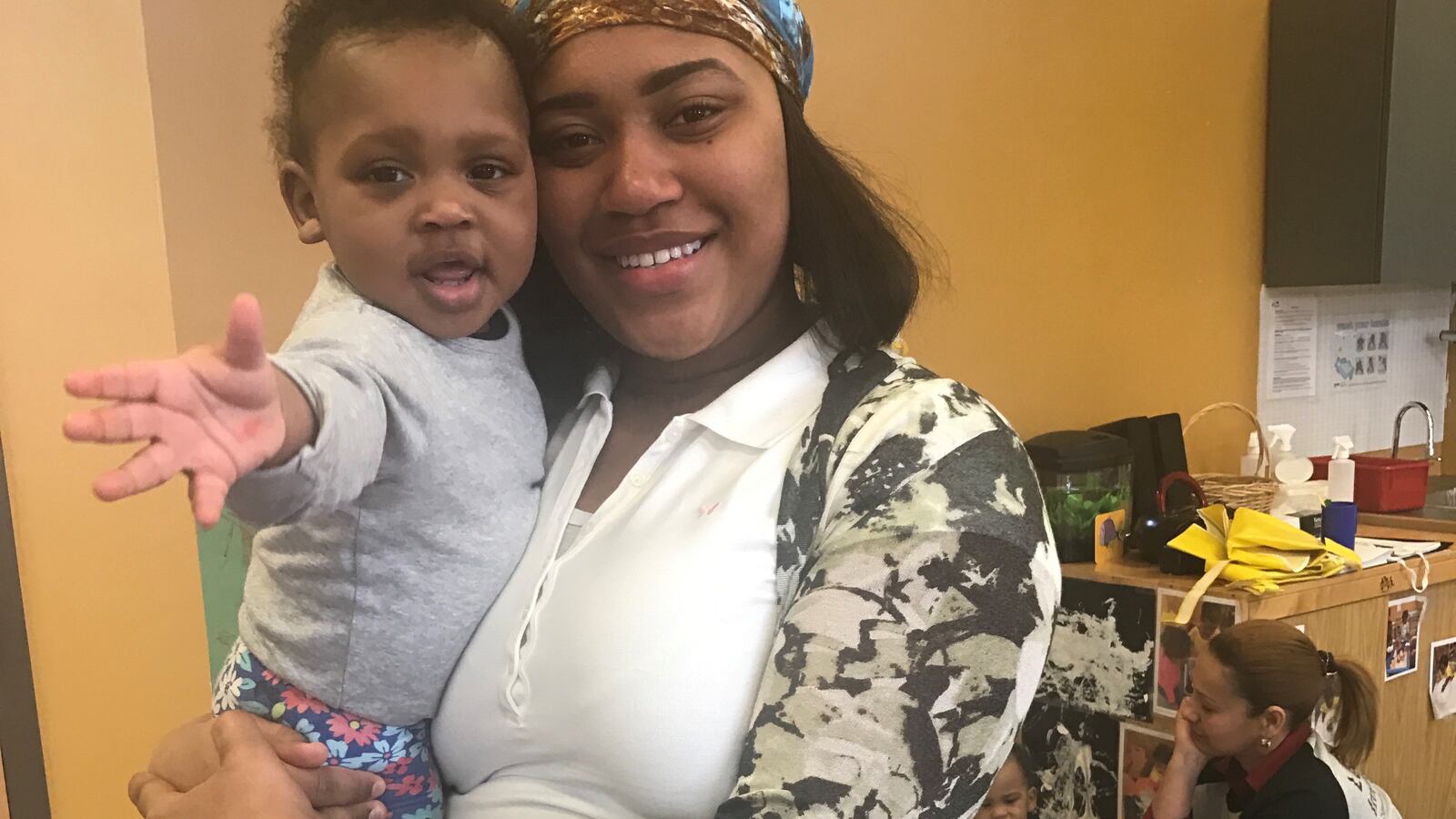When Jainellah Henry found out she was pregnant at 14 years old, she felt like any other teenager might — distraught and scared about her future.
“When I found out, I was crying,” said the sophomore at Bronx Collaborative High School. “I wanted to finish school and I wanted to make my parents proud.”
Recalling that time now, more than a year later, the emotions are still raw. As Jainellah shared her story, she started to cry a little, and reached over to hug the woman sitting next to her – her one-year-old daughter’s teacher at an early childhood center inside the DeWitt Clinton High School building, which also houses Jainellah’s school.
Janiellah sat at a small table — covered with childcare books and surrounded by photographs of toddlers painting — with her child’s teacher, her own father and her social worker. The whole group was assembled for an unconventional parent-teacher conference at one of the city’s more than 30 LYFE centers, which provide early education for infants and toddlers inside the schools their parents attend.
At a time when some schools in New York City are rethinking parent engagement and the chancellor has made it clear she thinks family involvement is central to improving schools, this program addresses a puzzling question: What does parent engagement look like when high school students are already parents themselves? The answer for the LYFE program is that it becomes a whole family affair.
During Jainellah’s parent-teacher conference, the sophomore sat at one end of the table, discussing her own child’s development with a LYFE center teacher. They talked about how Avery, Jainellah’s one-year-old, looked like she wanted to join the toddlers even when she was still an infant. They passed around pictures of Avery receiving a perfect attendance award, a proud moment for Jainellah as a mom.
Jainellah’s father, George Henry, sat at the other end of the table with Jainellah’s social worker, Susan Farrell-Laplante. She filled him in on Jainellah’s progress, much like a teacher would in a typical parent-teacher conference. They discussed Jainellah’s good grades, but also George’s worry that his daughter uses her phone too much and often shows up late to school.
At one point, Avery, wearing pants covered in multicolored flowers and a gray shirt, ran over to her mother and grandfather, making it a true three-generation meeting. The only clue that the group was inside a high school was that every so often the loudspeaker announced there was only “one minute to get to class” and students could be heard shuffling around the hallways.
The idea of supporting the entire family is embedded in every aspect of the LYFE program. Those who work at LYFE do not think of themselves simply as daycare providers; they see an opportunity to take a family in need and put all three generations on a better path.
“We meet families at very different points in their lives,” said Kara Ahmed, the citywide principal of LYFE since 2008. “It’s our job to work through the process and the journey with them.”
Jainellah was born on the island of Jamaica, where she lived with her mother. When her father, who lives in the Wakefield section of the Bronx, found out she was pregnant, he said he was “so mad” that he “didn’t know what to do.” Eventually, the family decided it was best for Jainellah to live with her father in New York.
She moved in with the 62-year-old, who is now on disability, and enrolled in school while George took care of Avery, either by himself or with the help of an older daughter. But he started to worry that he would have to hire a babysitter. Meanwhile, Jainellah, who had just moved to a new country and was a new mother, was attending a high school without a LYFE center — and it wasn’t going very well, her father said.
“At that tender age, having a baby and school, it was rough,” George said.
It wasn’t until they managed to switch Jainellah to Bronx Collaborative High School, enroll Avery in the LYFE program in the same building, and give George a break from babysitting, that everything started clicking for the family, her father said.
Now Jainellah is on a path to finish school, Farrell-Laplante says. She has gone to college fairs, the social worker said, and wants to become a nurse. The LYFE program will watch Avery for a little longer each day so Jainellah can get extra help in math and be fully prepared for college-level courses, she said.
During the school day, Jainellah said, she wanders the hallways and goes to class just like her classmates. The only difference is that sometimes, during lunch, she sneaks down to the LYFE center to peek at her daughter.
Life is “better now,” she said. “It’s OK.”

